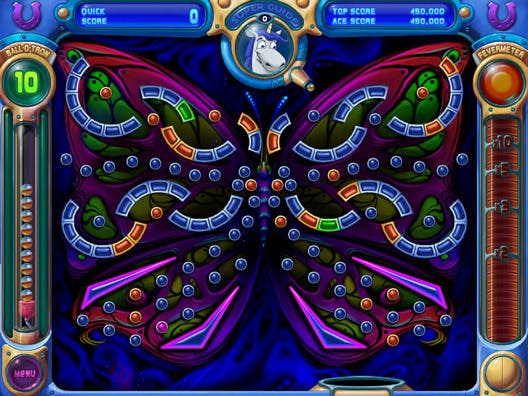Peggle Nights
Saturday night fever.
I like to think PopCap was surprised when Peggle Deluxe made the leap from casual moneyspinner and guilty pleasure to industry-wide disease. I like to think that, when Valve joked that The Orange Box was delayed because everyone was playing Peggle, the PopCap staff fluttered a paper fan to their shy faces, and giggled. "Little old uncool us?" I continue to imagine them saying. "There must be some kind of mistake."
It's easy to underestimate PopCap and the year it spent painstakingly creating a version of pachinko that would work outside of the arcades. It wasn't just the basic bagatelle mechanic that made everyone fumble about in their trousers. It was that cocktail of psychological components that makes casual gaming such a lie of a phrase.
Here are the basic rules, for newcomers. A level is full of pegs. Fire a ball into the pegs, and the pegs light up. Blue pegs are basic 100-point fodder. Orange pegs are the ones you have to clear to progress. Purple pegs give a score boost, and green pegs activate the special power of the character you're using. Bonuses are awarded for slides, trick shots, and blind luck. Once the ball drops out of play, the lit pegs disappear, and you shoot another ball. You only have control over two things: which direction you launch your ball, and when you launch it. It's so suffocatingly basic, you'd need something special to bring it out of mediocrity. And PopCap delivered.
The scoring in Peggle Deluxe was perfect. The simplicity of the system - a score per peg, multiplied by the amount of pegs hit - was intuitive, and allowed for an exponential increase in score for a cunning (or, let's be honest, lucky) shot. The first extra ball, awarded at 25,000 points, is hard to get, but once you've got it, the second two extra balls always seem tantalisingly within reach. These are the huge rewards, held within reach but not over-used, that casual gamers subconsciously demand.

There were also a brilliant set of audio rewards. The rising pitch of the peg collisions, the heavenly choir that punctuates an extra ball. The drum roll, and close-up Fever Cam which kicks in when you approach that final orange peg. And it's impossible to overstate how important that explosion of extreme fever was in making you feel like the Prince of Awesome. Go into the game's menu - there are three volume sliders. Music, Sound Effects, and Fever. You can mute everything, and still have that burst of Ode to Joy telling you you're brilliant. Don't think the chaps at PopCap aren't geniuses. They're fingering your brains. They're inside your chest, playing your ribs like a wet xylophone.
Then there were the challenges - unlocked by completing the adventure mode. Levels were reiterated with increased numbers of orange pegs. You had the audacity to duel against the Peggle masters. You survived ten rounds with one set of balls, and went for rock-hard score challenges. The second trophy, for completing these levels, was enough to keep you going for weeks. If you went for the final trophy - 100 per cent peg clearance on all levels - then you were cheerfully walking down the road to mental disorder.

The final thing that edged Peggle into the lands of love were the characters. Bjorn the Unicorn headed up the scholarly Peggle Institute, along with his friends, the Peggle Masters. From Renfield the eerie Pumpkin, to Jimmy the skateboarding chipmunk, they were charming enough to be popular with mums, and self-consciously funny enough to cut the mustard with ironic young men. It was warm humour, and even the most ardent dark-hearted goth couldn't fail to love that enthusiastic flower.
Why am I spending so long talking about the original Peggle? For any other game, you'd have every right to be angry at this shoe-gazing retrospective. But it's completely justifiable here, because Peggle Nights is virtually the same game. The only element of the original that PopCap has run with is the characters - Peggle Nights is a journey into their dreams. Not bizarro sleepy dreams; you won't see Jimmy being heckled by a Plasticene dinosaur during his Peggle "A" Levels. It's the aspirations of the characters. And the conversion of those dreams into five levels of Peggle each.


